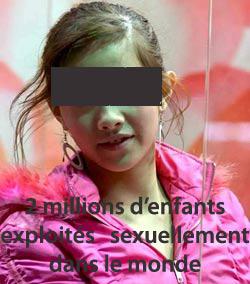
Millions of girls and boys worldwide are being used in prostitution, images of child sexual abuse (child pornography), trafficking and other forms of sexual exploitation. Exploited children often become either abused and exploited adolescents and adults, or even abusers and exploiters themselves.
Children in situations of armed conflict, and displaced, migrant and refugee children are particularly vulnerable to all forms of sexual exploitation. Local child prostitution rings exists in most countries of the world, and there are human trafficking markets specifically for children. Child sexual abuse in closed institutions, particularly religious organisations lacking transparency, is rife all over the world, and the sheer scale of corruption and cover-ups is only beginning to be understood.
Child sexual abuse and exploitation is exacerbated by economic and social upheaval, extreme poverty, deprivation and excessive consumerism. Violence, separation from their friends and families and drug misuse often follow. HIV/AIDS has increased demand for ever younger child prostitutes, in the mistaken belief that they present a much lower risk of infection.
CRIN has compiled a set of online safety resources to protect children from abuse. The resources are meant for children, parents and guardians, teachers, law-enforcement agencies, Internet Service Providers and all those who work with children.
The Convention on the Rights of the Child (CRC) says signatories must protect children from all forms of sexual exploitation and sexual abuse. There is also a specific UN treaty, called the Optional Protocol to the UN CRC on the sale of children, child prostitution and child pornography, laying out extra protections for children in this regard, and obligations for States.
Relevant articles of the Convention on the Rights of the Child (CRC) dealing with sexual exploitation and abuse are:
- Sexual exploitation (article 34): The State shall protect children from sexual exploitation and abuse, including prostitution and involvement in pornography.
- Sale, trafficking and abduction (article 35): It is the State's obligation to make every effort to prevent the sale, trafficking and abduction of children.
- Other forms of exploitation (article 36): The child has the right to protection from all forms of exploitation prejudicial to any aspects of the child's welfare not covered in articles 32, 33, 34 and 35.
- Protection from abuse and neglect (article 19): The State shall protect the child from all forms of maltreatment by parents or others responsible for the care of the child and establish appropriate social programmes for the prevention of abuse and the treatment of victims.
- Illicit transfer and non-return (article 11): The State has an obligation to prevent and remedy the kidnapping or retention of children abroad by a parent or third party.
- Rehabilitative care (article 39): The State has an obligation to ensure that child victims of armed conflicts, torture, neglect, maltreatment or exploitation receive appropriate treatment for their recovery and social reintegration.
Source: Crin
 FR
FR EN
EN AR
AR








